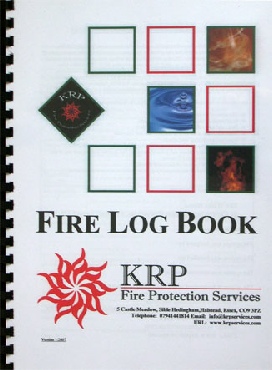
© KRP Fire Protection Services 2017
All rights reserved
 Fire Safety Training
Fire Safety Training
Fire Log Book
The British Standards 5839 part 1, and its measures (in section 3) to limit false alarms, has led to changes in the way alarm activations should be recorded and thus a new design for Log Books and Certificates. KRP's new Fire Log Book reflects all these requirements. Below are a few reasons why you should keep a Log Book:
Certain premises are certified under the Fire Precautions Act 1971. If your premises fall into this category then failure to keep a suitable Log Book up-to-date may be seen as a breach of the requirements of the certificate, which is a criminal offence.
If you ever have to claim for fire damage, you'll probably need to show that your fire safety systems were regularly checked. Your Fire Log Book demonstrates to your Insurance Company, the Fire Brigade and even a Court of Law that you had been effectively managing the fire safety on site.
Keeping an up-to-date Log Book gives the full history of the equipment on site, which will also help fire alarm/extinguisher engineers to trace and track down faults with the system.
It is a recommendation of the British Standards.
What the KRP Fire Log Book helps you to record:
The name of the responsible person
Details of the premises
Brief details of the maintenance agreement
Date of when you completed your fire risk assessment
Dates and times of all tests and events concerning your:
Fire Detection and Alarm Equipment
Emergency Lighting Equipment
Portable Fire Fighting Equipment
Dates, times and types of all faults and defects
Engineer’s Service Log of all maintenance
Dates and findings of staff fire drills and staff training

| Fire Alarms |
| Fire Safety Training |
| Fire Extinguishers |
| Dry Risers |
| Emergency Lights |
| Smoke Ventilation (AOV) Systems |
| Fire Safety Signage |
| Power Ethernet |
| Fire Risk Assessments |
| Fire Log Books |
